
More than just a buzzword now; indeed, it has profoundly dented the life of various industries. Of course, the most prominent beneficiaries are in accounting and auditing, where precision, safety, and transparency are paramount. This blog highlights the hope blockchain holds for such fields, its chances, and the challenges associated with installation.
The core of Blockchain Technology:
A blockchain is an online ledger decentralised with the ability to secure all transactions on one’s network. The following key features of the blockchain tackle many issues that have always troubled professional accountants and auditors.
- Decentralisation: This is peer-to-peer and would thus improve security because there is no centralised authority governing it.
- Immutability: The write-in data can’t be changed or erased. That understanding protects itself against fraud and tampering.
- Transparency: Transaction visibility to authorised users builds trust and accountability.
Such qualities become a transformative feature of blockchain – from a simple tool to an innovator experience in terms of efficiency, accuracy, and attentiveness in financial management.
Transformative Impacts of Blockchain in Accounting:
The data on which accuracy, efficiency, and integrity of accounting are in the lane toward optimisation through automation and, hence, secure real-time data updates through blockchain.
- Improved Data Integrity: Since blockchain acts as a ledger for tamper-proof entries, it eliminates the chances of producing fraudulent entries or human errors to provide reliable financial reporting.
- Automated Reconciliation: Manual reconciliation is now computerised, eliminating all the tedious, time-consuming tasks.
- Cost efficiency: Decreased functionalities in operations have translated this saving into an accountant’s time to work strategically in all the saving areas.
- Reporting In Real Time: This would mean real-time financial data updates, empowering businesses to make timely informed decisions.
Blockchain’s Role in Auditing:
Audits have confirmed the records in financial data, and their accuracy and compliance are enhanced through the blockchain for efficiency and reliability.
- Very much improved audit trails: The history of transactions stored permanently provides a clear and synced audit trail and thus reduces the time required for verification.
- Auditing Financial Transactions in Real Time: Real-time auditing can help lower the risks of finding discrepancies as early as possible, thus heightening confidence.
- Fraud Prevention: Protection from tampering that assures it will prevent misgivings in compliance and reporting.
Benefits of Accounting Courses for Professionals:
The use of blockchain in accounting and auditing is expanding, and professionals in these activity areas will have to learn and keep their skills up to date with new demands. An exclusive accounting course will enable delegates to:
- Keep Their Competitiveness: With blockchain technology knowledge, these professionals will be practically hunters in the employment market.
- Foster Efficiency: Knowing how to use blockchain to automate anything tedious will improve productivity.
- Learn to Evolve with Industry Trends: The relevance will be ever-changing with the emergence of new trends contingent upon a blockchain’s adaptability.
Challenges in Blockchain Adoption:
Although future promises, there are manifold challenges in transitioning blockchain systems into mainstream accounting and auditing usage. Those challenges include high implementation costs; this means that it would make the whole blockchain infrastructure very costly, leaving behind smaller organizations that cannot afford this technology. Secondly, it has technical complexity. The technicalities of the blockchain demand specialized knowledge; thus, an accounting course has to be undertaken to qualify or hire specialists. Lastly, regulatory uncertainty: Generally, there’s no standardized rule, and with that comes legal uncertainties, which hinder adoption.
The Future of Blockchain in Financial Management:
The entire path of transformation in accounting and auditing would be primarily influenced by integration with technologies such as artificial intelligence, the Internet of Things, and blockchain.
- Merge of AI and IoT: Smartest extension regarding Fraud Detection, Real-Time Audit, and Predictive Analytics.
- Mass Industry Adoption: This is much more likely to happen with increased blockchain accessibility as automotive networking, health, logistics, and several other industries will embrace it.
- Global Standardization: Closer collaboration among governments and international bodies to minimize all those regulatory uncertainties helps facilitate adoption.
Conclusion:
One of the innovative designs for the reconfiguration of accounting and auditing around the blockchain is a leap into transparency, leaning towards unmatched security and efficiency. Professionals no longer need to understand these technologies as an option that can be used capably in practice. Furthermore, organizations will then apply the method to reform and modernize their financial practices by processes that allow resilience in an ever-changing environment. Accounting courses and auditing courses highlighting blockchain applications are eye-openers to mastering this emerging technology, bringing professionals ahead in the transformation era.

Leave a Reply